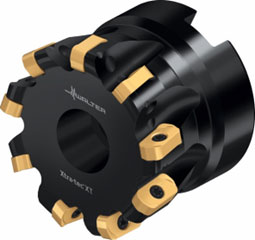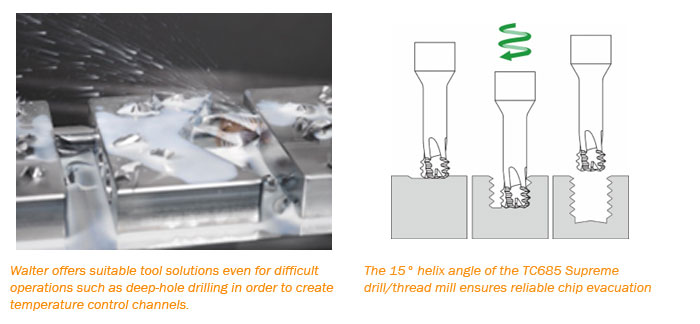Process Reliability in Injection Moulding Begins with the Mould: Walter’s Innovations Ensure Safe and Cost-Efficient Complex Machining
Injection moulding technology has advanced significantly, allowing for the high-volume production of complex shapes. This progress is largely due to sophisticated machining techniques now standard in mould and die making. These techniques are essential for creating intricate moulds, setting threads, and inserting channels and holes. Additionally, the evolution of plastics, such as glass-fibre reinforced plastics (GRP) and corrosive PVC, has expanded injection moulding capabilities.
For mould and die makers, these advancements present new opportunities but also increased risks and cost-efficiency challenges. Walter, a machining specialist from Tübingen, offers comprehensive solutions that address these challenges. Their portfolio includes indexable insert milling cutters, solid carbide drills optimized for deep-hole drilling, solid carbide milling cutters, and taps for machining hardened steels (ISO H), along with solutions for vibration damping and control.
Efficient Machining of Hardened Semi-Finished Products

Mould inserts are typically made from hardened steel (ISO H) with HRC values between 53 and 65 to ensure durability and wear resistance. Cost-efficiency is maximized when these semi-finished products are milled to the final contour in a single operation. Walter’s MC388 Advance solid carbide milling cutter is ideal for this, achieving high metal removal rates during roughing with long overhangs. Its unique properties make it suitable for users with medium batch sizes and high-quality standards, ensuring reliable and cost-efficient operations.
Low-Vibration Milling of Deep Cavities
Xtra·tec® XT M5008 high-feed milling cutter
 Milling deep cavities inevitably involves vibration, with radial forces causing potential tool deflection. To mitigate this, a milling cutter with a smaller lead angle is recommended. The Walter Xtra·tec® XT M5008 high-feed milling cutter is widely used in the industry for roughing deep cavities. Combining a low depth of cut with a high feed per tooth, it achieves a high metal removal rate. Its small 10° lead angle ensures axial cutting forces dominate, providing a stable process. Walter offers a range of indexable inserts for various materials, including ISO P, H, K, and S, enhanced by innovative Tiger·tec® cutting tool materials for high cutting data and long tool life.
Milling deep cavities inevitably involves vibration, with radial forces causing potential tool deflection. To mitigate this, a milling cutter with a smaller lead angle is recommended. The Walter Xtra·tec® XT M5008 high-feed milling cutter is widely used in the industry for roughing deep cavities. Combining a low depth of cut with a high feed per tooth, it achieves a high metal removal rate. Its small 10° lead angle ensures axial cutting forces dominate, providing a stable process. Walter offers a range of indexable inserts for various materials, including ISO P, H, K, and S, enhanced by innovative Tiger·tec® cutting tool materials for high cutting data and long tool life.
Hassle-Free Production of Temperature Control Channels and Internal Threads

Deep-hole drilling for temperature control channels is one of the most challenging operations in injection mould production. Walter’s DC 170 Supreme pilot drill excels in this, enabling deep-hole drilling up to 30 x Dc with increased stability due to its design, which places the carbide mass directly behind the cutting corner. This ensures highly accurate and high-quality drilled holes.

For inserting connectors into hardened material, Walter’s TC685 Supreme orbital drill/thread mill offers exceptional process reliability and tool life. It produces the core hole, thread, and chamfer in a single operation, with a milling geometry that stabilizes axial forces, reducing deflection and tool wear. The 15° helix angle and internal coolant ensure reliable chip evacuation, enabling the machining of tough steels and deep threads with ease.
By leveraging Walter’s advanced machining solutions, the injection moulding industry can achieve greater process reliability, cost-efficiency, and precision in producing complex
For more information on how Walter can enhance your injection moulding processes, visit www.walter-tools.com



